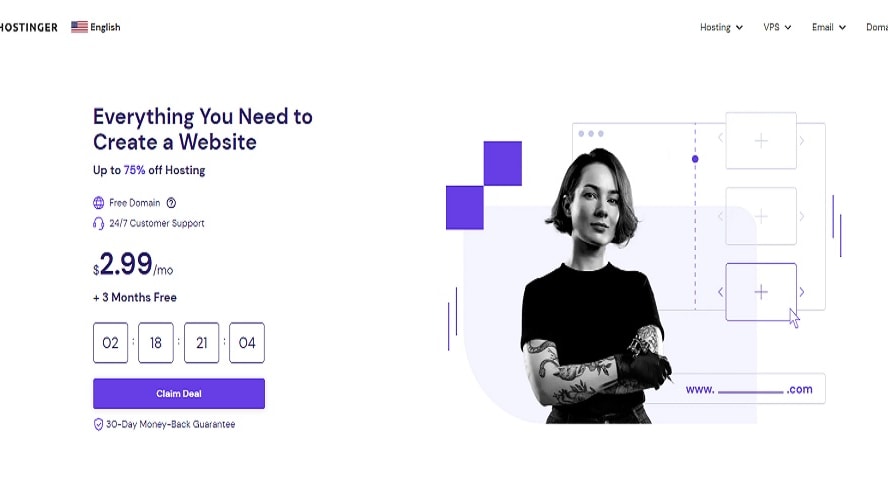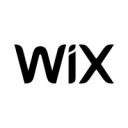Hostinger vs GoDaddy: Which web hosting provider is right for you?
- 01Hostinger vs GoDaddy: overview
- 02What's the difference between Hostinger and GoDaddy?
- 03Hostinger pros and cons
- 04GoDaddy pros and cons
- 05Hostinger compared to GoDaddy
- 06GoDaddy compared to Hostinger
- 07Features comparison
- 08Hostinger vs GoDaddy: Which is the best for your business?
- 09Promotions on Cloud Storage software
- 10Alternatives to Hostinger & GoDaddy
Access up to $144 savings on Hostinger & $1,000 on GoDaddy
Access up to $144 savings on Hostinger & $1,000 on GoDaddy
Web hosting is a critical foundation for any online presence, influencing everything from website performance to security. It's essential to choose a service that aligns with your specific needs, whether you're launching a personal blog or a bustling e-commerce site.
The big question is, which web hosting provider is the right fit for your project? In this article, we delve into a comprehensive comparison of two popular choices: Hostinger and GoDaddy. By exploring the distinct features each offers and highlighting key differences, such as their target user base, pricing structures, and performance capabilities, we aim to provide you with a clearer picture of which service may best suit your online endeavors.
Hostinger vs GoDaddy: overview
Hostinger and GoDaddy stand out as significant players in the web hosting industry, each offering distinct features tailored to a variety of website needs.
Hostinger is acclaimed for its affordable hosting solutions, making it an attractive option for individuals and small businesses. It provides a range of services including shared hosting, cloud hosting, and VPS hosting, along with user-friendly tools and a commitment to fast loading times. Conversely, GoDaddy is a well-established name in the web hosting and domain registration sector, known for its comprehensive service offerings. It offers a variety of hosting plans, including shared, dedicated, and WordPress hosting, coupled with additional services like website building and marketing tools.
In this Hostinger vs. GoDaddy comparison, we aim to guide you through the distinct advantages of each provider, helping you determine the most suitable hosting service for your specific website needs and goals.
What's the difference between Hostinger and GoDaddy?


One of the primary distinctions between Hostinger and GoDaddy lies in their target customer base and service specialization. Hostinger primarily caters to individuals and small businesses seeking cost-effective hosting solutions. It's known for offering competitively priced plans, which makes it a go-to option for users who are just starting out or operating on a tight budget. Hostinger's services include shared hosting, VPS hosting, and cloud hosting, with a focus on user-friendliness and efficient performance, particularly for WordPress websites.
GoDaddy, on the other hand, appeals to a broader spectrum of users, ranging from individuals to larger businesses. It offers a more diverse range of services beyond web hosting, such as domain registration, website building, and marketing tools. GoDaddy is recognized for its robust customer support network and an extensive array of features, making it a suitable choice for users who require a more comprehensive suite of website services and are willing to invest a bit more for premium options.
Another significant difference is in their user experience and interface. Hostinger provides a streamlined and simplified experience, with an emphasis on ease of use, especially beneficial for beginners. Its control panel is designed to be intuitive, making website management more accessible. Conversely, GoDaddy offers a more feature-rich interface, which, while offering more functionality, can be slightly more complex to navigate, especially for users who are new to web hosting.
Regarding scalability, GoDaddy stands out for its wide range of options that cater to growing businesses, offering more extensive resources and advanced hosting types like dedicated and premium WordPress hosting. Hostinger, while offering scalability within its own range, may be more suited to users who do not anticipate requiring extensive resources or advanced features in the short to medium term.
Hostinger pros and cons
What are the advantages of Hostinger?
- Affordability: Hostinger is known for its very competitive pricing, making it one of the most cost-effective options in the market. This is particularly appealing for individuals, bloggers, and small businesses with limited budgets.
- User-friendly interface: The platform offers a straightforward, intuitive control panel (hPanel), which is easy to navigate even for those who are new to web hosting.
- Good performance and speed: Hostinger provides reliable uptime and has servers in various locations around the world, ensuring good site speed and performance, which is crucial for user experience and SEO.
- Freebies included: Even with its basic plans, Hostinger offers several freebies such as a free SSL certificate and a domain (with some plans), which can be a significant saving for small website owners.
- Customer support: Hostinger offers 24/7 customer support through chat. Their support team is generally responsive and helpful, which is beneficial for users needing guidance.
What are the disadvantages of Hostinger?
- Limited resources on basic plans: The most affordable plans come with limited resources, such as disk space and bandwidth, which might not be sufficient for larger websites or those expecting high traffic.
- No phone support: Hostinger does not offer phone support. Users who prefer speaking to a support representative might find this inconvenient.
- Upselling tactics: Some users have reported that Hostinger employs upselling tactics, which can be a bit aggressive, especially during the initial sign-up process.
- Daily backups not standard: Daily backups are not included in the lower-tier plans. For frequent backups, users need to upgrade their plan or pay an additional fee.
- Performance inconsistencies: While generally reliable, some users have reported occasional inconsistencies in performance and uptimes, which might be an issue for more demanding or professional websites.
Compare Hostinger to other tools
GoDaddy pros and cons
What are the advantages of GoDaddy?
- Wide range of services: GoDaddy offers a comprehensive suite of services beyond just web hosting, including domain registration, website building tools, email hosting, and marketing services, making it a one-stop shop for many online needs.
- Strong customer support: GoDaddy provides extensive customer support options, including 24/7 phone support and live chat, which is a significant advantage for users who prefer multiple channels of assistance.
- User-friendly for beginners: The interface and tools provided by GoDaddy are designed to be user-friendly, particularly beneficial for beginners who are building and managing a website for the first time.
- Reliability and uptime: GoDaddy offers reliable uptime, which is critical for maintaining the accessibility and performance of websites.
- Scalability: With a range of hosting plans, including shared, VPS, and dedicated hosting, GoDaddy is well-suited to accommodate the growth of websites, making it easy to upgrade as your site or business expands.
What are the disadvantages of GoDaddy?
- Pricing and upsells: GoDaddy’s pricing structure can be a bit higher compared to some competitors, especially after the introductory period. Additionally, users may experience aggressive upselling of additional services and features.
- Limited resources on basic plans: Similar to many hosting providers, GoDaddy’s basic plans come with limitations in terms of storage, bandwidth, and processing power, which might not suffice for larger or high-traffic websites.
- Performance variability: Some users have reported variability in site loading speeds and performance, which can impact the user experience and SEO.
- Website migration: Unlike some other hosting providers, GoDaddy does not offer free website migration services, which might be a downside for users looking to transfer an existing site.
- Complexity of interface: While generally user-friendly, some users find that navigating the GoDaddy dashboard and managing various services can be overwhelming due to the sheer number of features and options available.
Compare GoDaddy to other tools
Hostinger compared to GoDaddy
Hostinger and GoDaddy are popular web hosting providers, but they differ in several key aspects. Hostinger is known for its affordability, offering budget-friendly plans with robust performance and excellent customer support. In contrast, GoDaddy often comes with higher pricing but provides a broader range of services, including domain registration and website building tools.
Hostinger boasts faster loading times, courtesy of its LiteSpeed web server, and a user-friendly interface, ideal for beginners. GoDaddy, on the other hand, offers a more extensive suite of additional products and services, catering to businesses of all sizes.
Is Hostinger better than GoDaddy?
In the web hosting arena, the choice between Hostinger and GoDaddy hinges on specific user requirements and preferences. While Hostinger appeals to those seeking cost-effective solutions without sacrificing performance, GoDaddy is tailored for users desiring a comprehensive range of services, even at a higher cost. Hostinger's edge in speed, facilitated by its LiteSpeed servers, is a significant advantage for businesses prioritizing website performance. Its intuitive interface also makes it a preferred choice for novices.
Conversely, GoDaddy's extensive service offerings make it a one-stop solution for larger enterprises needing a variety of web-related services beyond just hosting. Ultimately, the decision depends on balancing budget constraints with the need for speed and a wide range of services.
What is Hostinger best used for?
Hostinger is best used for individuals, small businesses, and startups looking for cost-effective web hosting solutions. With its budget-friendly plans and reliable performance, Hostinger is ideal for hosting personal blogs, portfolio websites, and small e-commerce sites. Their user-friendly interface and one-click installations make it accessible for beginners.
Hostinger's fast loading times, powered by LiteSpeed, benefit websites with a focus on speed and user experience. However, it may not be the best choice for large enterprises or businesses with complex hosting needs, as it primarily caters to those seeking affordable and straightforward hosting solutions.
Can Hostinger replace GoDaddy?
Hostinger can replace GoDaddy for many users, depending on their specific needs. Hostinger offers affordable web hosting with reliable performance, making it suitable for personal websites, blogs, and small businesses. It boasts faster loading times and a user-friendly interface, making it an attractive alternative to GoDaddy.
However, if you rely on GoDaddy's additional services like domain registration, website builders, and a broader range of hosting options, switching to Hostinger may not provide a seamless transition. It's essential to evaluate your requirements and budget before deciding whether Hostinger can fully replace GoDaddy for your specific web hosting and online presence needs.
Is Hostinger cheaper than GoDaddy?
Hostinger’s pricing is generally cheaper than GoDaddy when it comes to web hosting services. Hostinger is known for its budget-friendly hosting plans, which offer competitive pricing without compromising on performance. Their affordability makes them an excellent choice for individuals, small businesses, and startups looking to keep their hosting costs low.
In contrast, GoDaddy often comes with higher pricing for similar hosting packages. While GoDaddy offers a broader range of services beyond hosting, such as domain registration and website builders, Hostinger's primary advantage lies in providing cost-effective hosting solutions without sacrificing quality, making it a preferred option for those on a budget.
Is there a better Cloud Storage software than Hostinger?
Hostinger is a reliable web hosting provider, but it's essential to assess whether it aligns with your specific hosting requirements.
Some notable alternatives to Hostinger in the web hosting industry include GoDaddy, Bluehost, DigitalOcean, and Linode.
Your choice of web hosting service should be based on factors like your website's size, traffic volume, technical expertise, and budget constraints. While Hostinger offers cost-effective hosting with fast loading times and user-friendly features, other providers might offer specific benefits like enhanced customer support, specialized hosting solutions, or more extensive resources for larger websites.
Additional 10% off on all 12/24/48-monthly plan purchases on Hostinger
Get Additional 10% off on all 12/24/48-monthly plan purchases on Hostinger and up to $144 savings with Secret.
GoDaddy compared to Hostinger
GoDaddy and Hostinger are popular web hosting providers, each with its unique strengths. GoDaddy offers a wide range of services, including domain registration, website builders, and diverse hosting options, making it suitable for businesses of all sizes. However, it tends to be more expensive.
In contrast, Hostinger is known for its budget-friendly hosting plans, making it an excellent choice for individuals, small businesses, and startups. Hostinger offers faster loading times and a user-friendly interface, but its services may not be as comprehensive as GoDaddy's. Your choice between the two should align with your specific needs, budget, and the scale of your online presence.
Is GoDaddy better than Hostinger?
When considering GoDaddy versus Hostinger, it's essential to weigh their respective offerings against your specific web hosting needs. GoDaddy stands out for its comprehensive array of services, encompassing not just hosting but also domain registration and sophisticated website building tools. This makes it a robust choice for businesses seeking a full suite of web services under one roof, albeit at a higher price point.
Hostinger, while more wallet-friendly and boasting faster loading times, may fall short for those requiring a wide range of services. Thus, GoDaddy emerges as the preferable option for larger businesses or those needing a diverse set of web tools, despite its costlier plans, whereas Hostinger is more suited for smaller-scale or budget-conscious endeavors.
What is GoDaddy best used for?
GoDaddy is best used for individuals and businesses seeking a one-stop-shop for their online presence needs. It excels in domain registration, website building tools, and diverse hosting options, making it ideal for entrepreneurs, small businesses, and even larger enterprises. GoDaddy's user-friendly interface simplifies website management, while its comprehensive range of services caters to various online requirements.
Whether you need a domain name, website hosting, or e-commerce solutions, GoDaddy offers a convenient platform. However, its pricing can be higher than some competitors, so it's essential to evaluate your budget and specific needs before choosing GoDaddy for your online ventures.
Can GoDaddy replace Hostinger?
GoDaddy can potentially replace Hostinger, but it depends on your specific web hosting needs and priorities. GoDaddy offers a wide range of services, including hosting, domain registration, and website building tools, making it a comprehensive solution for individuals and businesses. However, Hostinger is known for its budget-friendly hosting plans with faster loading times, making it a preferred choice for those seeking affordable, high-performance hosting.
To determine if GoDaddy can replace Hostinger, consider your budget, technical requirements, and the scale of your online presence. While GoDaddy offers more services, Hostinger might be a better fit for those focused primarily on cost-effective and speedy web hosting solutions.
Is GoDaddy cheaper than Hostinger?
GoDaddy’s pricing is generally not cheaper than Hostinger when it comes to web hosting services. Hostinger is renowned for its budget-friendly hosting plans, offering competitive pricing without compromising on performance. This makes it an attractive choice for individuals, small businesses, and startups looking to keep hosting costs low. In contrast, GoDaddy often comes with higher pricing for similar hosting packages.
While GoDaddy offers a broader range of services beyond hosting, such as domain registration and website builders, Hostinger's primary advantage lies in providing cost-effective hosting solutions without sacrificing quality. Therefore, if affordability is a priority, Hostinger is likely the more cost-effective option compared to GoDaddy.
Is there a better Cloud Storage software than GoDaddy?
GoDaddy is a well-known hosting company, but it's essential to evaluate if it's the right fit for your specific hosting requirements.
Some notable alternatives to GoDaddy in the web hosting industry include Hostinger, Bluehost, Shopify, and WP Engine.
Your choice of web hosting service should consider factors like your website's size, traffic volume, technical expertise, and budget constraints. While GoDaddy offers a range of services and user-friendly features, other providers might offer faster loading times, more specialized hosting solutions, or better customer support.
46% off COM + Professional email on GoDaddy
Get 46% off COM + Professional email on GoDaddy and up to $1,000 savings with Secret.
Features comparison
GoDaddy's Professional Email Integration Outshines Hostinger

GoDaddy gains a significant advantage by offering professional email addresses linked to users' domain names. This feature not only enhances brand identity but also promotes a more professional image with every message sent. Whether you're running a business or a personal website, having an email address that matches your domain name lends credibility and trustworthiness to your online presence.
On the other hand, Hostinger, while offering various other commendable features, lacks this specific functionality. For users who prioritize projecting a professional image through email communication, GoDaddy emerges as the clear choice, making it a preferred SaaS platform for those seeking to strengthen their brand identity in their online interactions.
Hostinger Leads the Way for Ecommerce Integration, Unlike GoDaddy

When it comes to launching an ecommerce business, Hostinger takes a significant lead over GoDaddy. Hostinger offers an array of integrated inventory and order management tools, making it a seamless choice for aspiring online retailers. With Hostinger, you can effortlessly sell up to 500 products on your website and accept over 20 payment options worldwide.
On the other hand, while GoDaddy provides various website creation tools and resources, it doesn't offer integrated ecommerce features tailored for online stores. This distinction makes Hostinger the preferred option for those looking to establish a robust online retail presence, thanks to its dedicated ecommerce capabilities and user-friendly tools.
Hostinger Takes the Lead in User-Friendliness over GoDaddy

When evaluating ease-of-use, Hostinger emerges as the superior choice compared to GoDaddy. While GoDaddy remains a popular option for entrepreneurs, Hostinger provides a more refined and simplified user experience. Its modern and intuitive interface ensures that even novice website owners can effortlessly navigate the platform.
Whether setting up a new website or managing an existing one, Hostinger streamlines the process, making it less time-consuming and less confusing than with GoDaddy. Although GoDaddy offers user-friendly features, the frequent upsell attempts can sometimes overwhelm and distract novice users, affecting the overall user experience negatively.
Hostinger Excels in Lightning-Fast Website Load Speed Compared to GoDaddy

Website loading speed plays a pivotal role in the success of online businesses, influencing user experience and search engine rankings. Hostinger has taken a prominent lead in this aspect with its high-speed servers, ensuring that users benefit from lightning-fast website loading times. The optimization of Hostinger's infrastructure and use of technologies like LiteSpeed contribute to this impressive speed.
In contrast, while GoDaddy provides quality hosting services, it does not specifically prioritize enhancing website load speed as Hostinger does. This key distinction makes Hostinger the preferred choice for individuals and businesses seeking not only reliable hosting but also a competitive edge in delivering exceptional user experiences through swift website loading times.
GoDaddy Offers a Broader Integration Spectrum Compared to Hostinger

As for integrations, GoDaddy enjoys a slight advantage over Hostinger. While both platforms support essential integrations to enhance website functionality, GoDaddy provides a more extensive array of options. GoDaddy seamlessly integrates with various SaaS software, including ecommerce solutions, email marketing services, and social media tools. This breadth of integrations offers users enhanced scalability and greater control over their website's growth and performance.
In contrast, Hostinger also offers useful integrations but with a somewhat limited range in comparison. Users may encounter the need for additional workarounds to synchronize with specific third-party services. Therefore, your choice between the two depends on your specific integration requirements, as one tool's integration potential may be better suited to your needs than the other.
GoDaddy is Best at Offering Robust Security than Hostinger

GoDaddy's hosting services are completely secure. Its hosting services have garnered awards for Online Trust and WebTrust, underscoring its commitment to safeguarding users' data and websites. GoDaddy goes the extra mile by offering robust disaster recovery solutions and redundancy mechanisms, ensuring high availability through its global network of data centers.
While Hostinger also places a strong emphasis on security with advanced measures, GoDaddy's dedicated disaster recovery and redundancy capabilities grant it a distinct advantage. These features provide an extra layer of protection and business continuity, making GoDaddy an appealing choice for users who prioritize not only security but also seamless operations even in the face of unexpected challenges.
Both Hostinger and GoDaddy are Equal at Providing 24/7 Support

Both these SaaS platforms excel in customer support. These SaaS platforms have dedicated themselves to providing exceptional assistance to their users around the clock.
Hostinger boasts a responsive support team, available via chat, to swiftly address technical challenges and inquiries. On the other hand, GoDaddy offers its customers support through email, ensuring that users receive prompt and thorough guidance, whether it's troubleshooting technical issues or getting help with the setup process.
In a competitive industry, the unwavering commitment of both Hostinger and GoDaddy to prioritize customer satisfaction sets them apart. Users can rest assured that they have access to reliable support whenever needed, making their hosting and online endeavors smoother and more stress-free.
Subscribe to our newsletters.
No FOMO here. Stay up-to-date on all the latest deals and news with our monthly newsletter straight to your inbox like 110,000+ entrepreneurs (+ Get 10% off on on our Premium Membership!)
Hostinger vs GoDaddy: Which is the best for your business?
Hostinger is the best tool for you if:
- You prioritize affordability in web hosting without compromising on performance, making it ideal for startups and small businesses seeking a cost-effective online presence.
- Fast loading times are critical for your website, as Hostinger's use of LiteSpeed servers ensures superior speed, enhancing user experience and potentially boosting SEO rankings.
- You're a beginner in website management; its user-friendly interface simplifies hosting processes, making it easy to set up and manage your website without technical expertise.
- You need reliable customer support; Hostinger offers excellent 24/7 assistance, ensuring that help is always available to resolve any issues or answer queries promptly.
- Your focus is primarily on web hosting services, and you don't require the extensive additional services like domain registration and website builders that other providers offer.
GoDaddy is the best tool for you if:
- You seek a comprehensive range of web services beyond hosting, such as domain registration, website building, and online marketing tools, all from a single, reliable provider.
- Your business requires a variety of hosting options to scale up, as GoDaddy offers diverse hosting plans including shared, VPS, and dedicated hosting to meet different needs.
- You value having access to a wealth of additional resources like an extensive knowledge base, community forums, and professional services for website design and management.
- You prefer a well-established brand with a strong market presence, offering stability and a proven track record in hosting and domain services for businesses of all sizes.
- Integrated marketing tools are crucial for your online strategy, as GoDaddy provides features like email marketing and SEO services to enhance your website's visibility and reach.
Alternatives to Hostinger & GoDaddy
Promotions on Cloud Storage software
Start saving on the best SaaS with Secret.
Secret has already helped tens of thousands of startups save millions on the best SaaS like Hostinger, GoDaddy & many more. Join Secret now to buy software the smart way.
















